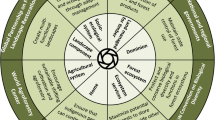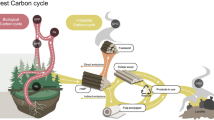Abstract
Among both forest practitioners and the general public, “forest health” has become an issue of contention. Whereas the debate over which treatments will best achieve healthy forests has been framed largely by the popular media and politicians as a struggle between industry and environmentalists, the views of the general public remain unexplored. Survey results from Oregon and Washington residents were used to assess the relationships between respondents’ self-described environmental or economic priorities and the following two variables: (1) acceptability of forest management practices and (2) perceived threats to forest health. Findings indicate that active management was generally accepted by a majority of respondents regardless of their environmental or economic orientation. Disagreement emerged, however, when the appropriateness of specific management practices within specific forest conditions was examined. Additionally, strong evidence was found for a relationship between self-described environmental or economic orientation and perceived threats to forest health. Those with an environmentally oriented viewpoint tended to perceive human-caused factors as the largest threats, whereas those with an economic orientation saw naturally occurring processes as the greatest threats. These findings suggest that the issue of contention is not active management per se. Rather, the major divisions in the forest health debate are defined by specific contexts and circumstances, as well as the management practices used.



Similar content being viewed by others
Literature Cited
Babbie E. 2001. The practice of social research. 9th ed. Wadsworth Publishing, Belmont, California
Baker M., J. Kusel. 2003. Community forestry in the United States: Learning from the past, crafting the future. Island Press, Washington, D.C
Bliss J. C. 2000. Public perceptions of clear-cutting. Journal of Forestry 98(12):4–9
Brown G., C. Harris. 1992. The USDA Forest Service: Toward the new resource management paradigm? Society and Natural Resources 5:231–245
Brown G., P. Reed. 2000. Validation of forest values typology for use in National Forest planning. Forest Science 46(2):1–8
Brunson M., B. Shindler. 2004. Geographic variation in social acceptability of wildland fuels management in the western states. Society and Natural Resources 17:661–678
Fortmann L., J. Kusel. 1990. New voices, old beliefs: Forest environmentalism among new and long-standing residents. Rural Sociology 55:214–232
Greider T., L. Garkovich. 1994. Landscapes: The social construction of nature and the environment. Rural Sociology 59(1):1–24
Hull B., D. Robertson, A. Kendra. 2001. Public understandings of nature: A case study of local knowledge about “natural” forest conditions. Society and Natural Resources 14(4):325–340
Jenkins A. F. 1997. Forest health: A crisis of human proportions. Journal of Forestry 95(9):11–14
Jones R. E., R. E. Dunlap. 1992. Social bases of environmental concern: Have they changed over time? Rural Sociology 57:28–47
Kennedy J. J., J. W. Thomas. 1995. Managing natural resources as social value. in R.L. Knight, S.F. Bates (eds.). A new century for natural resources management. Island Press, Washington, D.C. Pages 311–321
Kolb T. E., M. R. Wagner, W. W. Covington. 1994. Concepts of forest health: Utilitarian and ecosystem perspectives. Journal of Forestry 92(7):10–15
List P. 1996. Leopoldian forestry and the ethical acceptability of forest practices. in M. W. Brunson, L. E. Kruger, C. B. Tyler, S. A. Schroeder, (eds.) Defining social acceptability in ecosystem management: A workshop proceedings, June 23–25, 1992, Kelso, WA. Gen. Tech. Rep. PNW-GTR-369. U.S. Dept. of Agriculture, Forest Service, Pacific Northwest Research Station, Portland, Oregon. Pages 25–36
Little J. B. 2003. Un-Common ground: A controversy over the U.S. Forest Service’s appeals process is eroding carefully wrought partnerships. American Forests 109(2):45–51
Loomis J. B., L. S. Bair, A. Gonzalez-Caban. 2001. Prescribed fire and public support: Knowledge gained, attitudes changed in Florida. Journal of Forestry 99(11):18–22
Lowe G. D., T. K. Pinhey. 1982. Rural–urban differences in support for environmental protection. Rural Sociology 47:114–128
Shindler B., M. Brunson, G. Stankey. 2002b. Social acceptability of forest conditions and management practices: A problem analysis. Gen. Tech. Rep. PNW-GTR-537. USDA Forest Service, Portland, Oregon
Shindler B., P. List, B. S. Steel. 1993. Managing federal forests: Public attitudes in Oregon and nationwide. Journal of Forestry 91(7):36–42
Shindler B., E. Toman. 2003. Fuel reduction strategies in forest communities: A longitudinal analysis of public support. Journal of Forestry 101(6):8–14
Shindler B., J. Wilton, A. Wright. 2002a. A social assessment of ecosystem health: Public perspectives on Pacific Northwest forests. Department of Forest Resources, Oregon State University, Corvallis, Oregon
Smith, C., J. Gilden, J. Cone, and B. Steel. 1997. Oregon coastal salmon restoration: Views of coastal residents. Oregon Sea Grant, Corvallis, oregon, ORESU-S-97-001
Stankey, G. H. 1995. Values, uses, and institutions of natural resources: Key concepts and a framework for study of international changes. A report prepared for the USDA Forest Service, Pacific Northwest Research Station. Consortium for the Social Values of Natural Resources, Seattle, Washington
Steel B. S., P. List B. Shindler. 1994. Conflicting values about federal forests: A comparison of national and Oregon publics. Society and Natural Resources 7:137–153
Subcommittee on Public Lands, National Parks and Forests of the Senate Committee on Energy and Natural Resources. 1992. Forest ecosystem health and recovery act (S. 1156): Hearing before the 102nd Congress, second session. Senate Hearing 102-980 (Testimony of Senator Robert Packwood)
Tarrant M. A., H. K. Cordell. 2002. Amenity values of public and private forests: Examining the value–attitude relationship. Environmental Management 30(5):692–703
Task Force on Salvage Timber and Forest Health of the House Committee on Resources. 1995. Salvage timber and forest health: Part 1. Hearing before the 104th Congress, first session. Serial Number 104-44 (Testimony of Bernard Zaleha, Idaho Sporting Congress)
Tindall D. B. 2003. Social values and the contingent nature of public opinion, attitudes, and preferences about forests. The Forestry Chronicle 79(3):692–705
Vaske J. J., M. P. Donnelly. 1999. A value–attitude–behavior model predicting wildland preservation voting intentions. Society and Natural Resources 12:523–537
Vaske J. J., M. P. Donnelly D. R. Williams S. Jonker. 2001. Demographic influences on environmental value orientations and normative beliefs about national forest management. Society and Natural Resources 14:761–776
Winter G., C. A. Vogt S. McCaffrey. 2004. Examining social trust in fuels management strategies. Journal of Forestry 102(6):8–15
Wright, A., and B. Shindler. 2000. Watershed management in the central cascades: A study of citizen knowledge and information sources in the South Santiam Basin. Oregon State University Research Report, Corvallis, Oregon
Author information
Authors and Affiliations
Corresponding author
Rights and permissions
About this article
Cite this article
Abrams, J., Kelly, E., Shindler, B. et al. Value Orientation and Forest Management: The Forest Health Debate. Environmental Management 36, 495–505 (2005). https://doi.org/10.1007/s00267-004-7256-8
Published:
Issue Date:
DOI: https://doi.org/10.1007/s00267-004-7256-8




